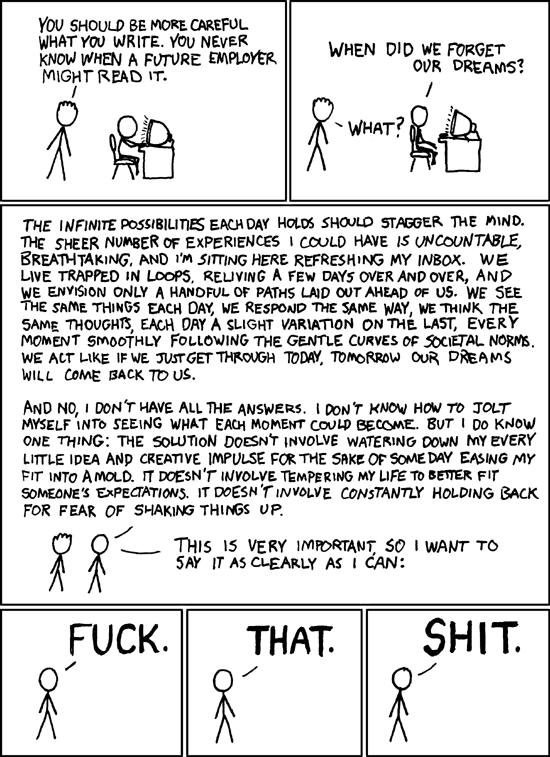
There is, as they say in the bullshit business, "a lot to unpack here." Let's see...
The use of "snowflake" as a term of derision is different from the context of Palahniuk's line from Fight Club. In the popular political discourse of today, "snowflake" has become a demeaning term for one perceived to be too fragile, too sensitive. This invokes the ephemerality of snowflakes, their delicate structure. The quote from Fight Club isn't doing that. It goes...
You are not special. You're not a beautiful and unique snowflake. You're the same decaying organic matter as everything else. We're all part of the same compost heap. We're all singing, all dancing crap of the world.There's no emphasis on fragility in that. Instead, the focus is on uniformity and mundanity. All credit due to Chuck Palahniuk should go to him. He's a good writer and the quote has strong resonance. The book was successful and the movie based on it is a kind of cult classic or whatever. I'd happily concede that some of the recent popularity of "snowflake" as a term of derision was probably inspired by that line in Fight Club. But people using the term aren't "quoting" him. The usage is different. In fact, they're quoting the same people that Palahniuk was quoting when he wrote that line.
For decades, the term "snowflake" was applied to people, particularly children, with the emphasis being placed on uniqueness. The line in Fight Club works because the reader would have some cognizance of this older, more established usage. The character in the book, Tyler Durden, is posing a direct, scathing rejection of a classic, formulaic platitude. In the more recent usage in political discourse, rather than making a direct comparison, people are subverting the older usage by putting a new twist on an old metaphor. To put it bluntly...
-Some starry-eyed educators told a bunch of kids: "You are inherently special and unique just being who you are. Like a snowflake, you're different from every other snowflake in the universe."
-Then Tyler Durden (in a work of fiction) told a bunch of grown-ups who'd heard that message: "You are not like a snowflake. You're a lump of meat that is going to fall apart someday. And that's not special."
-Then as the term got thrown around over the next 20 years, people started using it as an insult, saying essentially, "Yeah, you know what? You really are like a snowflake: fragile and weak."
So no, mocking someone as a "snowflake" isn't quoting Fight Club.
Also, Fight Club isn't a satire. I'm not even going to waste my time with that claim. Not every book has to be a satire. Get over yourself.
Also, I'm a bit annoyed on Chuck Palahniuk's behalf that his sexuality is being brought up in this context. He only came out as gay because he believed that he was about to be outed by others. He doesn't style himself a "gay writer" or focus on gay issues. Throwing "gay" in there is irrelevant and my suspicion is that the person who wrote this crap is trying to cast everything in some kind of trite, simplistic political drama where everything is Right vs. Left. The "Right" is supposedly the side using "snowflake" as an insult and they're also supposedly the side that is anti-gay, so this person wants to mock them for "quoting" a gay man. This kind of sleazy discursive diversion really gets on my nerves, and was ultimately what motivated me to open up my blog and write about it. It's bad behavior and should be called out for what it is.
And while I'm here, Fight Club has nothing to do with fascism. Stop projecting your fantasies onto everything.
But mostly, I find it hilarious that when I went and looked at the comments on Facebook, a recurring theme was that people who tried to rebut some of this crap were generally dismissed as having only seen the movie and told that they needed to read the book. But Tyler Durden doesn't blow up any skyscrapers in the book. It's a pretty important plot point that's basically impossible to miss. So several people, including the original author of this little gem, are all advertising to anyone who's actually read Fight Club that they are pretending to have read the book, but did not actually read the book. And that's just marvelous. Right there, I have beautiful validation of why I should keep using Facebook. Where else could I find such high-grade bullshit?
And hey, let's make is a double feature. So here's some more crap...

I keep seeing posts along these lines and even though I'm used to it, I am a bit baffled anyway, perhaps because this just isn't how I was raised. My parents were/are devoutly religious, but they never wanted or expected the public school system to be part of that. I realize that a bunch of Christians got all huffy over the whole kerfuffle with Madelyn Murray O'Hair back in the 60's and 70's, but this whole thing always struck me as a no-brainer. Your local schoolteacher might have different views on religion than you do. And if not, maybe some day that could change (you won't always have the same local schoolteacher). So the more religious you are, it would seem that the more you'd want your local schoolteacher not to be involved in the religious education of your children. Ergo, this aspect of the First Amendment protects you. Q.E.D. Easy, right? Except apparently that's an unpopular view?
It strikes me as bizarre, but I guess I'm grateful that my parents weren't like this.
Oh, and people killed a whole lot of kids in schools long before 1963. So cut it out with the historical revisionism!


